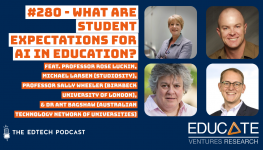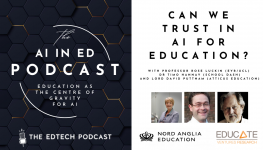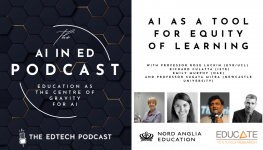#182 – Innovation
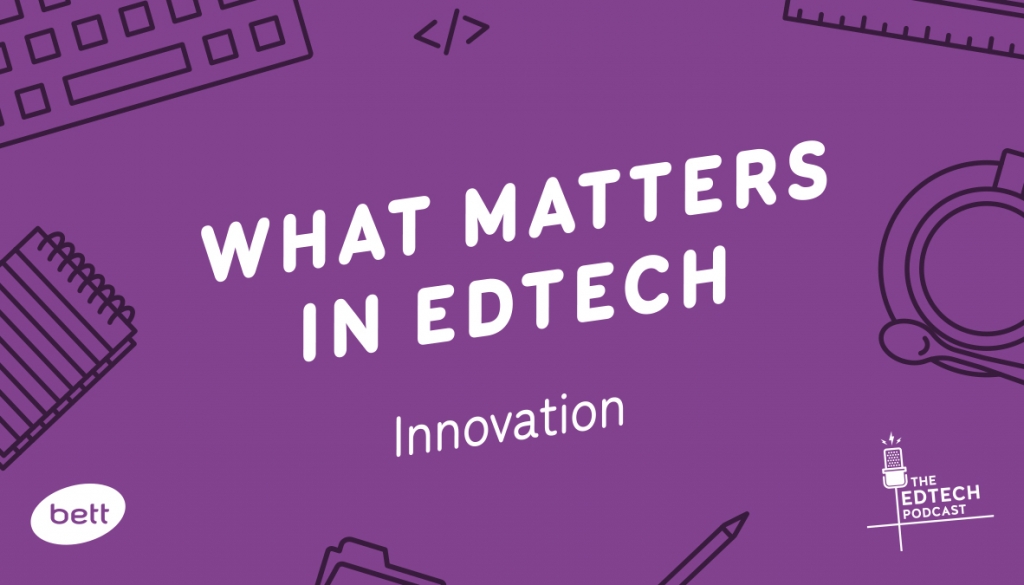
Subscribe on iTunes, Spotify, Stitcher, TuneIn
Hello! Welcome to the fifth episode of our “What Matters in Edtech” series, supported by Bett. Thank you to pi-top for sponsoring this week’s episode.
This series is all about the things that matter in education, and how and when tech might help.
In this series, we are looking at themes that shape Bett’s conference programme in 2020:
- Inclusion & SEND
- Future tech and trends
- Wellbeing
- Empowering teaching and learning
- Innovation
- Skills
You can follow the conversation using #Edtechpodcast and #Bett2020
What’s in this episode?
This episode is all about Innovation.
What is innovation? How can it be measured and sustained? How can a culture of innovation be developed, and what examples of pedagogical and technological innovation have come to the fore in recent years? We speak to entrepreneurs, ecosystem developers, academics and educators about the role of innovation and hear about how innovation is evolving in virtual reality in Singapore, career technical education in the US, STEAM education in Belgium, and real-world problem-solving in Bhutan. Plus, why educators are inherent innovators and more about the edtech innovation testbed here in the U.K. Phew!
HAPPY LISTENING!!
People
Sophie Bailey is the Founder and Presenter of The Edtech Podcast
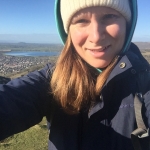
Sophie is the founder of the iTunes new and noteworthy, The Edtech Podcast. The mission of The Edtech Podcast is to improve the dialogue between ‘ed’ and ‘tech’ for better innovation, through storytelling. The podcast is downloaded 2000+ times a week, from over 145 countries with the UK, US & Aus in the top 3. Sophie is a mentor and advisor within the edtech community. If she’s not interviewing a University Lecturer, School Leader, Ex-Angry Bird, NGO, or Investor about education innovation, she’s chasing her son around the park or binge-reading Homo Deus. Twitter: @podcastedtech
Nancy Wilkinson, Senior Programme Manager – Education, Nesta
 Nancy leads Nesta’s work on technology and education, overseeing a partnership with the Department for Education to help schools make more effective use of technology.
Nancy leads Nesta’s work on technology and education, overseeing a partnership with the Department for Education to help schools make more effective use of technology.
Nancy previously worked at the Wellcome Trust as a policy advisor leading on education policy aiming to improve science education in the UK. She also worked as a specialist at the House of Commons Education Select Committee, working on inquiries including recruitment and retention of teachers and primary assessment.
She is vice-chair of a school governing body at a primary school in Tower Hamlets. Twitter: @NancyWilko
Dr Peter David Looker, formerly Head, Teaching, Learning and Pedagogy Division, Nanyang Technological University, Singapore, now Chief Learning Officer, Eon Reality
 Peter is now the Chief learning Officer for Eon Reality. Peter has been working in learning and teaching development since 2002, after being a lecturer and Associate Professor in English Literature for 16 years. His main areas of interest are in the development of sustainable learning and teaching cultures, policy development, learning space design and student assessment. Twitter: @Peterloo51
Peter is now the Chief learning Officer for Eon Reality. Peter has been working in learning and teaching development since 2002, after being a lecturer and Associate Professor in English Literature for 16 years. His main areas of interest are in the development of sustainable learning and teaching cultures, policy development, learning space design and student assessment. Twitter: @Peterloo51
Niko Lindholm, Program Director, Eduspaze (formerly XEdu)

EduSpaze is Singapore’s first edtech accelerator supported by Enterprise Singapore, the enterprise development agency. It aims to nurture a vibrant edtech startup ecosystem that serves the education sector in Singapore and Southeast Asia. Eduspaze helps early-stage edtech startups go to market, accelerate their growth, and co-innovate with other stakeholders in the space to address sector-specific challenges with innovative solutions that improve learning outcomes and the impact of education. EduSpaze is part of Spaze Ventures. Twitter: @nikolindholm
Jesse Lozano, Co-founder and CEO, pi-top

Jesse has a Political Philosophy degree and a Law Degree from Kings College London, he has worked since the age of 14 in various manual and desk jobs and paid for his degrees whilst completing them. After graduating Jesse took on a role as a FOREX journalist for City A.M. the largest financial newspaper in London.
After a year at City AM, Jesse took up a role as a political consultant to Westminster groups and took time to become a full stack developer focusing on automating the research needs of his clients.
Jesse advised 13 House of Lords representatives and Members of Parliament, had appearances on Sky News and the BBC discussing Economic policy and helped to shape major marketing initiatives in UK Politics.
Jesse then successfully entered Entrepreneur First Cohort 3 and met his Co-founder Ryan Dunwoody where they came up with the idea for pi-top in July 2014.
Jesse’s main roles in pi-top are high level product creation, team hiring, partnership building and investment. During his time at pi-top Jesse has been instrumental in creating an industry recognized best in class STEM solution.
In 2018, Jesse was recognized as the EY Entrepreneur of the Year Rising Star for the United Kingdom. Twitter: @GetPiTop
Thomas Thoss, M.Ed., Enterprise Networks Instructor, Orange Technical College – Mid Florida Campus
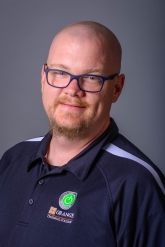 TJ Thoss teaches Ethical Hacking and Smart Home Technologies at Orange Technical College in Orlando, FL. He has been teaching for 15 years. His students go through training based on CompTIA’s A+ and Network+ as well as Cisco’s CCNA, EC-Council’s Certified Ethical Hacker and CEDIA’s Electronic Systems Certified Frameworks.
TJ Thoss teaches Ethical Hacking and Smart Home Technologies at Orange Technical College in Orlando, FL. He has been teaching for 15 years. His students go through training based on CompTIA’s A+ and Network+ as well as Cisco’s CCNA, EC-Council’s Certified Ethical Hacker and CEDIA’s Electronic Systems Certified Frameworks.
Mr. Thoss collaborated with CEDIA and helped developed the Electronic Systems Certified Framework (Smart Home Technologies) which was the first educational frameworks in this rising industry.
TJ has been recognized by the EC-Council as a Certified Instructor for their Certified Ethical Hacker certification. TJ worked with the EC-Council to become the first Technical College to earn the EC-Council Authorized Training Center designation in Central Florida. In addition, Mr. Thoss serves as the Florida SkillsUSA Technology Coordinator and Chairman of the Board of Directors. In his limited spare time, TJ loves spending time with his wife, Lisa, and three awesome kids, Baleigh, Kenny, and Abby. Twitter: @ocpsotc
Garland Green, IT Director at International School of Brussels (ISB)
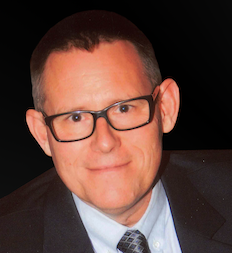
Director of Information Technology for the International School of Brussels and over twenty years of experience as an educational technologist, school administrator, network engineer, certified DPO, and overall data privacy advocate. Garland’s area of concentration is on educational leadership, educational technology, and leaders’ impact on students and the role leaders play in ensuring the digital privacy of the individual. Twitter: @ggreenaz
Karma Lhakyi, Director, Fablab Bhutan
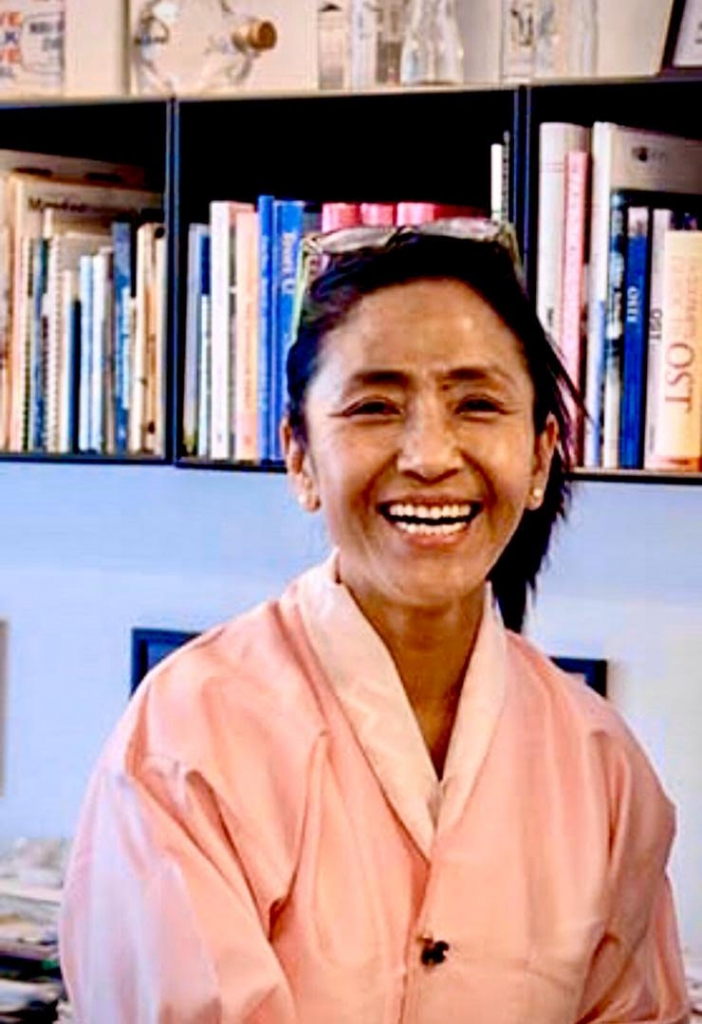
Through extensive involvement in the digital fabrication, innovation and STEM in Bhutan, Karma is recognised as a passionate influencer, leader and change- maker. She has a reputation as a leading innovator throughout Bhutan, as a change maker, and as a strong leader, manager and co-ordinator – with a profound belief in co-operation, partnerships and empowerment. Karma is currently working on a Pan-Bhutan Network of digital fabrication in Bhutan based on ‘open’ technology and innovation.
Karma is an accomplished though leader and key player in both national and global initiatives and movements that empower everyone through open technology, knowledge and know-how. Karma is both founder and architect behind the Bhutan`s first flagship Fabrication Laboratory (Fablab Bhutan), where her unique laboratory is breaking down boundaries between bits and atoms, from pioneering digital fabrication to the internet of things – achieving particular success in interdisciplinary initiatives. Fablab bhutan was commissioned by Center for Bits and Atoms, Massachusetts Institute of technology. She drives changes in the complex institutions of engineering education, research programs and nurturing a culture of creative emergence from highly capable staff, startups, public outreach and delivering and exceeding on an ambitious strategy.
Tsewang Lhundup, Research & Development Engineer, Fablab Bhutan
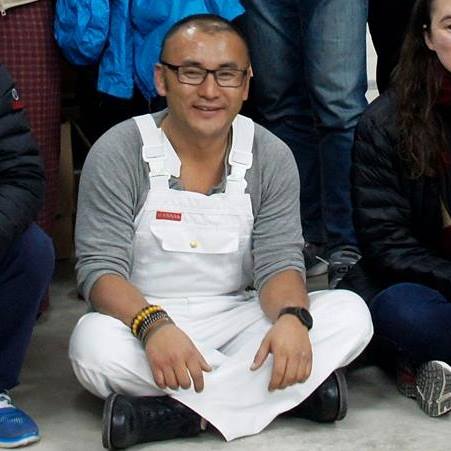
Tsewang Lhundup is a Bhutanese Danish Research and Development Engineer. Tsewang discovered the power and happiness of making for himself, and others. This has become a driving force in his life to make a transformation in the world of science and technology. Since joining Fablab Bhutan, Tsewang has worked towards democratising access to digital fabrication tools throughout Bhutan.
His passion for coding, science and technology led him to the maker world. He saw the power of sharing how to use an Arduino or create a 3D model using CAD software. Tsewang is a maker, creator, innovator, educator and learner.
Quotes from this episode
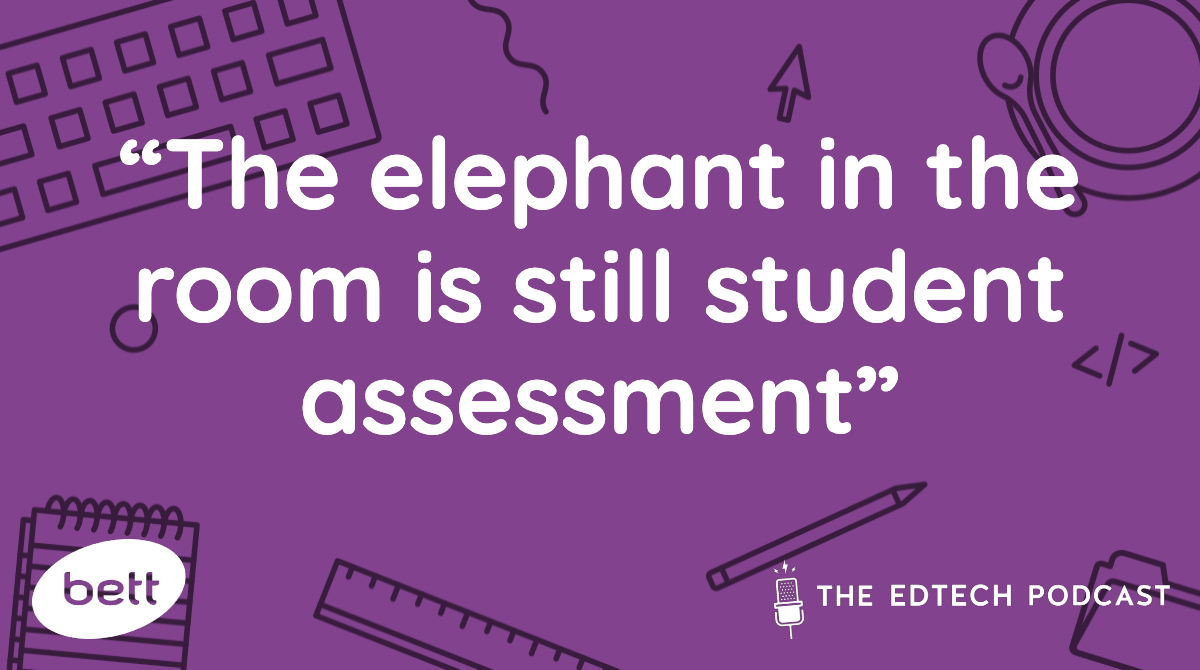
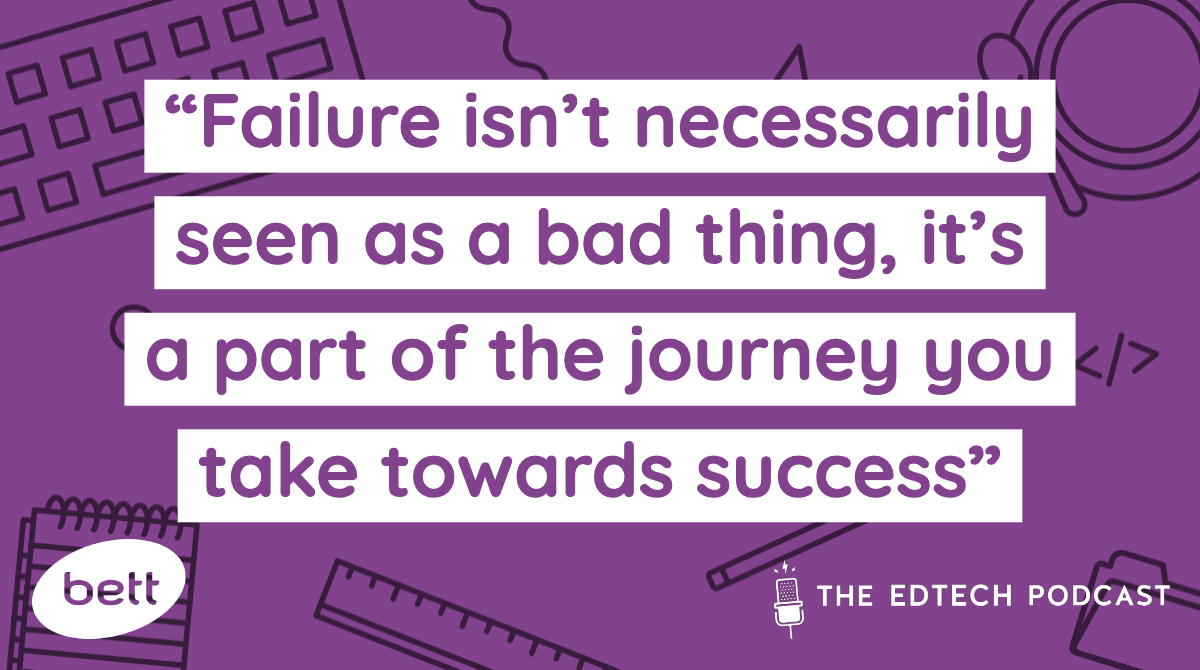
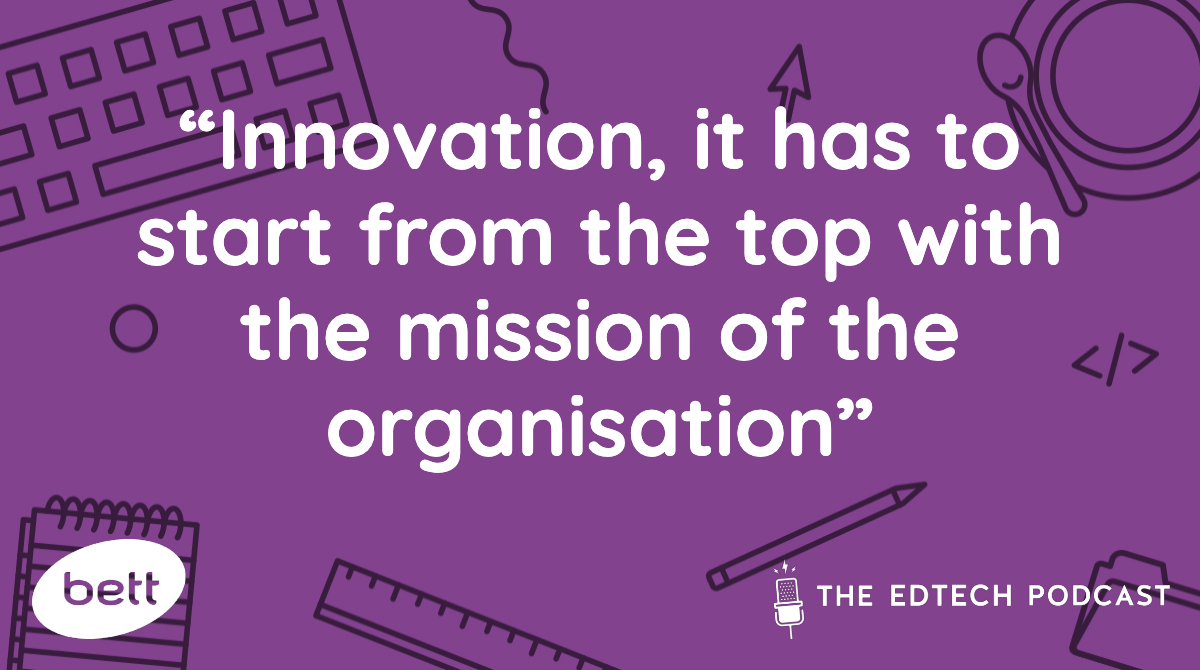
References from this week’s episode
- Nancy Wilkinson – Nesta website, profile
- Nancy Wilkinson – LinkedIn
- Nancy Wilkinson – Twitter
- Nesta – website, homepage
- Nesta – twitter
- Department for Education – website, homepage
- Edtech Innovation TestBed – Nesta website, further information
- University of Durham – website, homepage
- Assessment as Learning: The role of retrieval practice in the classroom – article from Impact Journal, part of Chartered College of Teacher, Sept 2017
- House of Commons, Education Select Committee – website, further information
- Teacher recruitment and retention strategy, UK Gov – website, further information
- EdTech Innovation Fund: Meet the grantees –
- AI – explanation
- VR – explanation
- The Nesta Standards of Evidence – Nesta website, further information
- Logic model – explanation
- Theory of change – Nesta website, further information
- Nesta Reports – Nesta website, further information
- Exploring the future of AI in education – Nesta Report via Nesta website, June 2018
- Educate – website, further information
- Innovate My School – website, homepage
- Edtech Impact – website, homepage
- Chartered College of Teaching – website, homepage
- EdTech Innovation Fund: Meet the grantees – Nesta website, further information
- Peter Looker – LinkedIn
- Peter Looker – Twitter
- EON Reality – website, homepage
- EON Reality – twitter
- Nanyang Technological University (NTU), Peter Looker’s role was Head of Teaching, Learning and Pedagogy Unit – NUT website, Peter’s profile
- NTU – website, homepage
- University of New South Wales – website, homepage
- Improving Teaching And Learning In Higher Education: A Whole Institution Approach: A whole institute approach by Vaneeta D’Andrea and David Gosling – link for further information on book via Amazon
- University of Utrecht – website, homepage
- Education Innovation at University of Utrecht – further information via university website
- Centre of Teaching and Learning – further information
- Jesse Lozano – LinkedIn
- Pi-Top – website, homepage
- Pi-Top – twitter
- Robotics – explanation
- AI – explanation
- Project based learning – pi-top website, further information
- pi-top PBL resources – templates put together for teachers, curriculum directors, and administrators
- Soft skills – explanation
- Outliers by Malcolm Gladwell – link to book details via amazon
- Elon Musk – twitter
- Tesla – twitter
- SpaceX – twitter
- Bhutan and pi-top project – medium article, May 2019
- Thomas Thoss – LinkedIn
- Orange Technical College – website, homepage
- Orange Technical College – twitter
- Orange County Public Schools – twitter
- Industry certifications – further information
- Cyber Security – further information via National Cyber Security Centre
- Cisco certification – further information via Cisco website
- Smart Home Technician – example certification via City and Guilds
- Ethical Hacking – IT Governance UK
- EC Council Certified Ethical Hacker Frameworks – further information via EC Council website
- Career Technical Education – further information via California Department of Education
- Python – explanation
- Pi-top – website, homepage
EC council software – EC Council website - Summer Camp – explanation
- 10 eLearning Platforms You Can Use For Online Courses – list of resources via E-Learning Industry
- Skills USA – website, homepage
- Garland Green – LinkedIn
- Garland Green – twitter
- International School of Brussels (ISB) – website
- International Schools of Brussels – twitter
- What happened with Linux in 2018 – article via Mirco Focus, Dec 2018
- Coding – explanation
- Aerodynamics – explanation via Nasa
- Tinkercad – website, homepage
- 3D printing – explanation
- Sculpey – website, homepage
- Blender software – website, homepage
- Pi-top and Internal School of Brussels project – further information via pi-top website
- Python coding – website, homepage
- Raspberry Pi – website, homepage
- Start Up – explanation
- The Cluetrain Manifesto – further information about the book
- David Weinberger
- Data privacy / protection – further information via Gov UK
- Data Protection Officer – further information via Digital Guardian
- GDPR – further information via Gov UK
- How Apple’s iPad has evolved since 2010, from original to mini to Pro – article via inews, Sept 2019
- A history / timeline of Social Media – further information
- Data subjects – explanation
- Doc Searls
- Fablab Bhutan
- Bhutan’s Government
- Unicef Bhutan
- Hi-tech high in the Himalayas – Medium article, May 2015
- Gross national happiness in Bhutan: the big idea from a tiny state that could change the world – Guardian article, 2012
- World’s only carbon-negative country Bhutan is giving us renewable energy goals – India Today article July 2018
- Fab Foundation – website, homepage
- A visit from Fab Lab Bhutan – Field Ready article July 2019
- ‘Let nature be your teacher’: Bhutan takes conservation into the classroom – Guardian article, Jan 2013
- Bhutan Education Blueprint, Ministry of Education – Blueprint
Answers below from Karma Lhakyi and Tsewang Lhundup
- What does innovation mean to you?
For us innovation is a philosophy and an excellent vehicle of diversity. In Bhutan, our society’s mental blueprint or mental infrastructure is based on the Four Harmonious Freinds. All the Bhutanese from child to old age can relate to this story and thus our Bhutan innovation framework / Sustainable Development is based on this Four Harmonious Friends.
If one has a point of view that matters, or have reflected on one´s own world view, than innovation as a vehicle of diversity can be very powerful tool – one can unleash our ideas and creativity into the world. The point is more diversity of ideas and creativity, more rational actors we create, that will ultimately contribute to the balanced growth and sustainable development. Diversity merely means managing quotas between black, brown and white peoples, it is much deeper.
As for innovation philosophy, we can work for the change we want to see based on the reflection of our worldview, which is undergoing profound changes brought about by technological advancements leading to change habits and lifestyle of people around the globe. Many countries in the world are gearing towards this change and building foundations to embrace this technological advancement. Bhutan is also taking profound initiatives and programs towards this change by stimulating Innovation and STEM education.
- How can innovation be sustained?
We believe that the key to sustainability of innovation lies in the transferring of ownership. Prior to the establishment of flagship Fabrication Laboratory of Bhutan (Fablab Bhutan) in 2017 with support from Massachusetts Institute of Technology and Dassault Systemes solid work, our core fablab Bhutan team has conducted three intensive years of research – here we have met with the government policy makers incl. Prime Minister, local government officials, incubators, entrepreneurs, students and teachers of universities across Bhutan, we have also appeared in prime time national news to discuss about the coming of Fablab Bhutan or in other words establishment of Applied Science Laboratory. During this research period, it was apparent that, transferring the ownership of innovation to the people is the KEY.
Thus reflecting back over the last two years of exponential organic growth of Fablabs across Bhutan, probably our Fablab Bhutan team might have succeeded in the transferring of ownership to our people. We are now in the collaboration with Bhutan government, Mulitrael Agencies, companies and universities – we are in the process of establishing one Super Fablab, Fab Textile, Bio fablab, mobile Fablab and 8 other fablabs across Bhutan, thereby leapfrogging Bhutan into the 21st century.
Likewise, in France 2017, more than 2000 makers, inventors, artists, researchers,entrepreneurs and creative people across 135 nations have all unanimously voted for Bhutan to be the Host nation for world ́s biggest and most important digital fabrication summit Fab 17 in Bhutan (see the attached Draft Fab 17 Dossier – but please keep it only with you, as we are still work-in-progress).
- What pedagogic / technological innovations are you seeing?
In 2019, we have worked on a pilot project “Unleash Bhutan – Learning by Doing” in swift collaboration with UNICEF Bhutan, Ministry of Education, Pi-Top, Fablab Bhutan and four integrated youth centres across Bhutan. During this 12 months, we have successfully trained more than 20 trainers from this youths centre and outreach over 600 youths, here Ms. Karma Lhakyi has imposed 50% mandatory for the female participation, to our amazement, we had actually more than 60 % female participation.
The beauty of Fourth Industrial Revolution is that it is giving an equal opportunity for all those so called developed and underdeveloped nations across the world. The nature of open-sourced and low-cost technology like Raspberry Pi, which Pi-Top is build upon, it gives tremendous opportunity for everybody to learn, innovate and grow. Reading and writing is no longer enough, if you do not know how to code you will be the illiterate of this 21st century. Pi-Top london has always been generous and very supportive in Bhutan. Once we have conducted a joint workshop in rural school of Bhutan, here we have a mix of teachers and students, it has been proven that youths are early adopters of technology, after 30 minutes of training the students began to teach their teachers in Pi-top univers.
- How can we measure innovation?
Balanced innovation is probably the best measurement tool. Bhutan has pioneered measuring and targeting “Gross National Happiness” as its national goal, rather than the norm of Gross Domestic Product for our development endeavours. And it has been a leader in becoming not just carbon neutral but carbon negative, but somehow this is a top down approach.
In order for us to successfully measure the balance innovation, our founder Ms. Karma Lahkyi have coined “Gross Local Happiness”. This is a bottom – up approach, and it compliments our government ́s top-down Gross national Happiness. Perhaps, through this yet to develop balance innovation metrics, we will be avail to measure. There is no way to Happiness, Balanced innovation is the only way to happiness.
- What resources do you recommend to inspire people in this space? (People, projects, books).
Actually we are always inspired by ingenuity of local peoples, but to name few:
-
Proffessor Neils Gershienfield, Director for Centre of Bits and Atoms, Massachusetts Institute of Technology, USA (further information via TED)
-
Sherry lassister, Fab Foundation – LinkedIn
-
Proffessor Mahabir Pun, a local Nepalese teacher, Social Entrepreneur and an activist. – article in My Republique, Oct 2019
Projects:
- Lessons From Bhutan: Embrace cultural differences to effect change – full journal, April 2011 by Laurie Levine, Alison Kelsey, and Kim McCormack
Books:
- Jugaad Innovation, Navi Radjou, Jaideep Prabhu & Simone Ahuja – link to book via Amazon
- Work Rules by Laszlo Bock – link to book via Amazon
- Designing Reality, Proffessor Neils Gershienfield – link to book via Amazon
Thank you to Bett for supporting the What Matters in Edtech series
The What matters in Edtech Series is produced by The Edtech Podcast and supported by Bett. For more innovations content check out the BETT 2020 programme where innovation is a key theme. Register here. To search across all events, browse across our global events calendar.
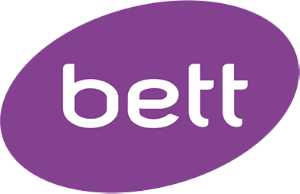
Bett is the first industry show of the year in the education technology landscape, bringing together over 800 leading companies, 103 exciting new EdTech startups and over 34,000 attendees. People from over 146 countries in the global education community come together to celebrate, find inspiration and discuss the future of education, as well as seeing how technology and innovation enable educators and learners to thrive. Each year our CPD-accredited seminar programme provides over 300 hours of workshops, talks and discussions addressing the most prominent issues in education, delivered by the people who are leading change and innovation. Find out more and register today: https://www.bettshow.com/.
And a big thank you to pi-top for sponsoring this episode
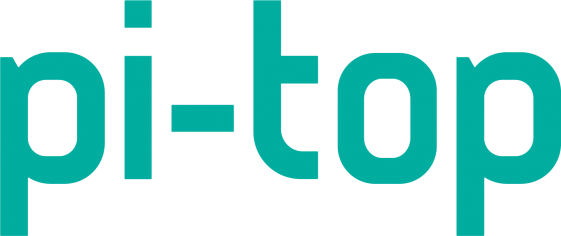
Learn more about pi-top at https://www.pi-top.com/.
Tell us where you are listening in from
We’d love to hear about innovative technology or approaches you are developing or using in adult education. Leave your stories in the comments below. Alternatively, record a quick free voicemail via speakpipe for inclusion in the next episode. Finally, you can post your thoughts or follow-on links via twitter @podcastedtech or via The Edtech Podcast Facebook page.

